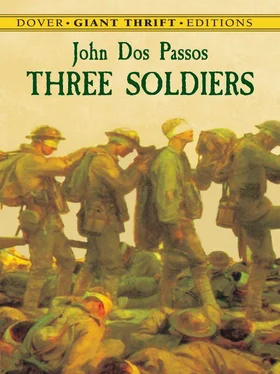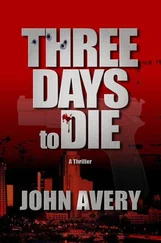“I thought you’ld be here,” said Geneviève Rod in a quiet voice beside him.
Andrews felt strangely tongue-tied.
“It’s nice to see you,” he blurted out, after looking at her silently for a moment.
“Of course you love Pelléas.”
“It is the first time I’ve heard it.”
“Why haven’t you been to see us? It’s two weeks… We’ve been expecting you.”
“I didn’t know… Oh, I’ll certainly come. I don’t know anyone at present I can talk music to.”
“You know me.”
“Anyone else, I should have said.”
“Are you working?”
“Yes… But this hinders frightfully.” Andrews yanked at the front of his tunic. “Still, I expect to be free very soon. I’m putting in an application for discharge.”
“I suppose you will feel you can do so much better… You will be much stronger now that you have done your duty.”
“No… by no means.”
“Tell me, what was that you played at our house?”
“‘The Three Green Riders on Wild Asses,’” said Andrews smiling.
“What do you mean?”
“It’s a prelude to the ‘Queen of Sheba,’” said Andrews. “If you didn’t think the same as M. Emile Faguet and everyone else about St. Antoine, I’d tell you what I mean.”
“That was very silly of me… But if you pick up all the silly things people say accidentally… well, you must be angry most of the time.”
In the dim light he could not see her eyes. There was a little glow on the curve of her cheek coming from under the dark of her hat to her rather pointed chin. Behind it he could see other faces of men and women crowded on the balcony talking, lit up crudely by the gold glare that came out through the French windows from the lobby.
“I have always been tremendously fascinated by the place in La Tentation where the Queen of Sheba visited Antoine, that’s all,” said Andrews gruffly.
“Is that the first thing you’ve done? It made me think a little of Borodine.”
“The first that’s at all pretentious. It’s probably just a steal from everything I’ve ever heard.”
“No, it’s good. I suppose you had it in your head all through those dreadful and glorious days at the front… Is it for piano or orchestra?”
“All that’s finished is for piano. I hope to orchestrate it eventually… Oh, but it’s really silly to talk this way. I don’t know enough… I need years of hard work before I can do anything… And I have wasted so much time… That is the most frightful thing. One has so few years of youth!”
“There’s the bell, we must scuttle back to our seats. Till the next intermission.” She slipped through the glass doors and disappeared. Andrews went back to his seat very excited, full of unquiet exultation. The first strains of the orchestra were pain, he felt them so acutely.
After the last act they walked in silence down a dark street, hurrying to get away from the crowds of the Boulevards.
When they reached the Avenue de l’Opéra, she said:
“Did you say you were going to stay in France?”
“Yes, indeed, if I can. I am going tomorrow to put in an application for discharge in France.”
“What will you do then?”
“I shall have to find a job of some sort that will let me study at the Schola Cantorum. But I have enough money to last a little while.”
“You are courageous.”
“I forgot to ask if you would rather take the Métro.”
“No; let’s walk.”
They went under the arch of the Louvre. The air was full of a fine wet mist, so that every street lamp was surrounded by a blur of light.
“My blood is full of the music of Debussy,” said Geneviève Rod, spreading out her arms.
“It’s no use trying to say what one feels about it. Words aren’t much good, anyway, are they?”
“That depends.”
They walked silently along the quais. The mist was so thick they could not see the Seine, but whenever they came near a bridge they could hear the water rustling through the arches.
“France is stifling,” said Andrews, all of a sudden. “It stifles you very slowly, with beautiful silk bands… America beats your brains out with a policeman’s billy.”
“What do you mean?” she asked, letting pique chill her voice.
“You know so much in France. You have made the world so neat… ”
“But you seem to want to stay here,” she said with a laugh.
“It’s that there’s nowhere else. There is nowhere except Paris where one can find out things about music, particularly… But I am one of those people who was not made to be contented.”
“Only sheep are contented.”
“I think I have been happier this month in Paris than ever before in my life. It seems six, so much has happened in it.”
“Poissac is where I am happiest.”
“Where is that?”
“We have a country house there, very old and very tumbledown. They say that Rabelais used to come to the village. But our house is from later, from the time of Henri Quatre. Poissac is not far from Tours. An ugly name, isn’t it? But to me it is very beautiful. The house has orchards all round it, and yellow roses with flushed centers poke themselves in my window, and there is a little tower like Montaigne’s.”
“When I get out of the army, I shall go somewhere in the country and work and work.”
“Music should be made in the country, when the sap is rising in the trees.”
“‘D’après nature,’ as the rabbit man said.”
“Who’s the rabbit man?”
“A very pleasant person,” said Andrews, bubbling with laughter. “You shall meet him some day. He sells little stuffed rabbits that jump, outside the Café de Rohan.”
“Here we are… Thank you for coming home with me.”
“But how soon. Are you sure it is the house? We can’t have got there as soon as this.”
“Yes, it’s my house,” said Geneviève Rod laughing. She held out her hand to him and he shook it eagerly. The latchkey clicked in the door.
“Why don’t you have a cup of tea with us here tomorrow?” she said.
“With pleasure.”
The big varnished door with its knocker in the shape of a ring closed behind her. Andrews walked away with a light step, feeling jolly and exhilarated.
As he walked down the mist-filled quai towards the Place St. Michel, his ears were filled with the lisping gurgle of the river past the piers of the bridges.
Walters was asleep. On the table in his room was a card from Jeanne. Andrews read the card holding it close to the candle.
“How long it is since I saw you!” it read. “I shall pass the Café de Rohan Wednesday at seven, along the pavement opposite the Magazin du Louvre.”
It was a card of Malmaison.
Andrews flushed. Bitter melancholy throbbed through him. He walked languidly to the window and looked out, into the dark court. A window below his spilled a warm golden haze into the misty night, through which he could make out vaguely some pots of ferns standing on the wet flagstones. From somewhere came a dense smell of hyacinths. Fragments of thought slipped one after another through his mind. He thought of himself washing windows long ago at training camp, and remembered the way the gritty sponge scraped his hands. He could not help feeling shame when he thought of those days. “Well, that’s all over now,” he told himself. He wondered, in a half-irritated way, about Geneviève Rod. What sort of a person was she? Her face, with its wide eyes and pointed chin and the reddish-chestnut hair, unpretentiously coiled above the white forehead, was very vivid in his mind, though when he tried to remember what it was like in profile, he could not. She had thin hands, with long fingers that ought to play the piano well. When she grew old would she be yellow-toothed and jolly, like her mother? He could not think of her old; she was too vigorous; there was too much malice in her passionately-restrained gestures. The memory of her faded, and there came to his mind Jeanne’s overworked little hands, with callous places, and the tips of the fingers grimy and scarred from needlework. But the smell of hyacinths that came up from the mist-filled courtyard was like a sponge wiping all impressions from his brain. The dense sweet smell in the damp air made him feel languid and melancholy.
Читать дальше












